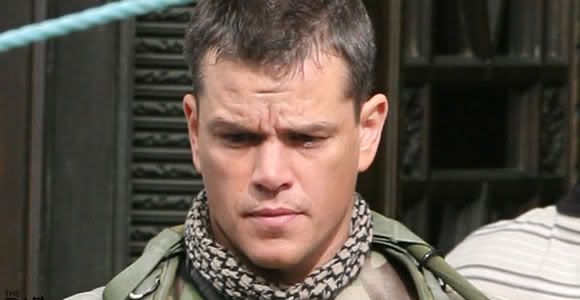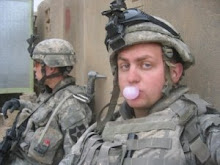Nearly half a decade ago in a stuffy barracks room corner, I created this blog for a very simple reason: to communicate to my family the curious aspects of Army life. Before I committed, I enjoyed writing but never had an impulse to do so. Writing for sheer pleasure was a difficult concept to grasp; the act was often sullenly attached to school assignments I habitually ignored in favor of reading dry military history texts. But after I got started, writing became my only creative outlet, a way to relay thoughts and experiences that I would never dare speak out loud. Emails, letters and occasionally blog postings were sent from the grounds of Fort Lewis and enormous bases carved out of Iraqi soil. My only audience was an assembly of blood – family members and close friends were the only ones following my travels. In an all male infantry unit, writing was the furthest thing from grunt machismo. This blog was a closely guarded secret.
Violent explosions have the power to transform bodies and minds. They also have the ability to transform perspectives. A decimated house in Mosul brought me from snarky spectator to battlefield observer once I saw bricks scattered about the street like violent confetti. I decided at that moment to record as much as I saw through writing and photographs to relay thoughts and images that were nearly impossible to articulate. It was my way of talking out the often painful and difficult situations during my unit’s deployment. Writing was catharsis long before I understood the meaning of the word. As the deployment crawled past the one year mark during the worst period of violence of the entire war, hand written letters seemed like they were being delivered to another galaxy. Writing here became my only connection to a place that didn't feel quite like home anymore.
The Third Stryker Brigade completed its mission when we razed the home of the Islamic State of Iraq in the summer of 2007. My own mission of serving in the Army was accomplished shortly after we returned home. After I got out, I set my sights on an education, which felt like a battle unto itself. My high school grades were impressive in their mediocrity - I failed, among many other classes, freshman and sophomore English. College seemed like a task far outside my abilities, but I quickly found my military experience prepared me with the discipline I didn't have as a teenager. The most difficult part of school was making sure my VA benefits came when they were due.
Along with thousands of veterans going to school, I found myself without a monthly living stipend when the Post-9/11 GI Bill went live last year. Simply navigating a complex benefit package like the GI Bill required research and painful lessons learned, but how to tell a landlord I couldn't make rent wasn't in any FAQ provided by the federal government. I sent my grievances to the only person I knew at the Department of Veterans Affairs - Brandon Friedman - and within hours I was speaking with Keith Wilson, the Director of Education Services for the Department. He was able to answer enough questions to spur a followup post, which went far to explain some confusing and frustrating aspects of the GI Bill.
Apart from my posts written from Iraq, this blog has been mainly introspective and nostalgic in nature; a look back at the good old days. The two posts dealing with the GI Bill were a departure for the norm. It felt great to step outside my own experiences and help other veterans who needed the right information directly from the right source. I spent the next few months burying myself in homework and working part time before Brandon came to me with some news: the Department of Veterans Affairs was expanding its new media reach, and it needed someone to helm a forthcoming blog.
I took Brandon up on his offer after much deliberation. I still had school to finish, but it was rather unsatisfying. I missed the challenges of the Army. I missed having a mission.
Today I announce a new mission: the launch of VA's blog. It's called VAntage Point, and its purpose is simple: to transform the mode of communication between veterans and VA. The main column will be written by staff writers: myself and Lauren Bailey, the Special Assistant to the Chief Technology Officer. Brandon is the editor, and will occasionally chime in when not covering my drafts in red ink. We are set to tackle issues affecting veterans, with emphasis on getting the right information to the right veteran at the right time. The exciting part for everyone involved is the Guest Post column. Anyone can submit a post on a topic concerning veterans, and it will be published as long as it's coherent and competently argued. We're not just looking for fluff pieces either. If you had a bad experience with a VA doctor or couldn't get through on a help line, we want to hear about it. We're looking for a cross section of guest writers - anyone from a student struggling with reintegration to a VA surgeon to a Vietnam veteran and everyone in between. For the first time in the history of the Department of Veterans Affairs, ideas and communication will flow two ways.
Of course, my new job carries with it some implications for this blog. Now that I work for the government (again), I relinquish a bit of editorial freedom of what I can say here. That's the downside to increasing the reach of my words. But with it I gain legitimacy and authority to speak about veterans' issues, and I have a hard time thinking of a better way to use my energy. That is not to say I won't have enough time for Army of Dude. Whenever I have a post in mind that doesn't fit at VAntage Point, it will go here. But sadly, I can't focus on my writing here like I once did. Things will change around here, but this blog will remain. VA wanted me to write for them, and with me comes my style and personality unabridged. Both will survive the migration. I encourage my readers interested in veteran issues to bookmark VAntage Point and check back often.
I cannot imagine where I'd be without the people I've met along the way. It'd take all day to mention all the talented writers in the milblog community that have linked to me for years, or to list all the readers who have left countless messages of support both here and through emails. I've made many friends and luckily few enemies through my writing, and I hope that is something that continues both here and my new home. Thank you for reading. I look forward to my new mission, and I know I can count on many of you for support.
Violent explosions have the power to transform bodies and minds. They also have the ability to transform perspectives. A decimated house in Mosul brought me from snarky spectator to battlefield observer once I saw bricks scattered about the street like violent confetti. I decided at that moment to record as much as I saw through writing and photographs to relay thoughts and images that were nearly impossible to articulate. It was my way of talking out the often painful and difficult situations during my unit’s deployment. Writing was catharsis long before I understood the meaning of the word. As the deployment crawled past the one year mark during the worst period of violence of the entire war, hand written letters seemed like they were being delivered to another galaxy. Writing here became my only connection to a place that didn't feel quite like home anymore.
The Third Stryker Brigade completed its mission when we razed the home of the Islamic State of Iraq in the summer of 2007. My own mission of serving in the Army was accomplished shortly after we returned home. After I got out, I set my sights on an education, which felt like a battle unto itself. My high school grades were impressive in their mediocrity - I failed, among many other classes, freshman and sophomore English. College seemed like a task far outside my abilities, but I quickly found my military experience prepared me with the discipline I didn't have as a teenager. The most difficult part of school was making sure my VA benefits came when they were due.
Along with thousands of veterans going to school, I found myself without a monthly living stipend when the Post-9/11 GI Bill went live last year. Simply navigating a complex benefit package like the GI Bill required research and painful lessons learned, but how to tell a landlord I couldn't make rent wasn't in any FAQ provided by the federal government. I sent my grievances to the only person I knew at the Department of Veterans Affairs - Brandon Friedman - and within hours I was speaking with Keith Wilson, the Director of Education Services for the Department. He was able to answer enough questions to spur a followup post, which went far to explain some confusing and frustrating aspects of the GI Bill.
Apart from my posts written from Iraq, this blog has been mainly introspective and nostalgic in nature; a look back at the good old days. The two posts dealing with the GI Bill were a departure for the norm. It felt great to step outside my own experiences and help other veterans who needed the right information directly from the right source. I spent the next few months burying myself in homework and working part time before Brandon came to me with some news: the Department of Veterans Affairs was expanding its new media reach, and it needed someone to helm a forthcoming blog.
I took Brandon up on his offer after much deliberation. I still had school to finish, but it was rather unsatisfying. I missed the challenges of the Army. I missed having a mission.
Today I announce a new mission: the launch of VA's blog. It's called VAntage Point, and its purpose is simple: to transform the mode of communication between veterans and VA. The main column will be written by staff writers: myself and Lauren Bailey, the Special Assistant to the Chief Technology Officer. Brandon is the editor, and will occasionally chime in when not covering my drafts in red ink. We are set to tackle issues affecting veterans, with emphasis on getting the right information to the right veteran at the right time. The exciting part for everyone involved is the Guest Post column. Anyone can submit a post on a topic concerning veterans, and it will be published as long as it's coherent and competently argued. We're not just looking for fluff pieces either. If you had a bad experience with a VA doctor or couldn't get through on a help line, we want to hear about it. We're looking for a cross section of guest writers - anyone from a student struggling with reintegration to a VA surgeon to a Vietnam veteran and everyone in between. For the first time in the history of the Department of Veterans Affairs, ideas and communication will flow two ways.
Of course, my new job carries with it some implications for this blog. Now that I work for the government (again), I relinquish a bit of editorial freedom of what I can say here. That's the downside to increasing the reach of my words. But with it I gain legitimacy and authority to speak about veterans' issues, and I have a hard time thinking of a better way to use my energy. That is not to say I won't have enough time for Army of Dude. Whenever I have a post in mind that doesn't fit at VAntage Point, it will go here. But sadly, I can't focus on my writing here like I once did. Things will change around here, but this blog will remain. VA wanted me to write for them, and with me comes my style and personality unabridged. Both will survive the migration. I encourage my readers interested in veteran issues to bookmark VAntage Point and check back often.
I cannot imagine where I'd be without the people I've met along the way. It'd take all day to mention all the talented writers in the milblog community that have linked to me for years, or to list all the readers who have left countless messages of support both here and through emails. I've made many friends and luckily few enemies through my writing, and I hope that is something that continues both here and my new home. Thank you for reading. I look forward to my new mission, and I know I can count on many of you for support.










